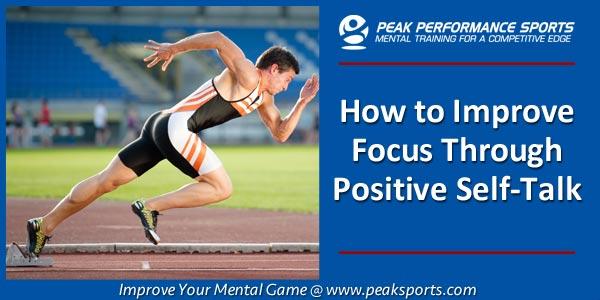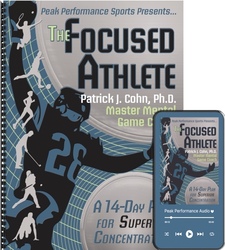
Carr’s Positive Self-Talk
Does negative self-talk make it difficult to focus during competitions?
Do you wish you could be more positive after mistakes?
Negative self-talk is when you berate yourself for making mistakes during practice or competition.
Obviously, negative self-talk hurts your confidence and enjoyment in sports.
How can you turn negative self-talk into positive self–talk, the mental conversation you have that helps your confidence?
Dr. Christopher M. Carr explored the relationship between focus and optimal performance in his study, “Sport Psychology: Psychologic Issues and Applications (Physical Medicine & Rehabilitation Clinics of North America, 2006).”
Carr identified positive self-talk as one technique that can enhance competitive focus.
He defines self-talk is the conscious and subconscious dialog that occurs in your mind before, during, and after competition.
Self-talk affects your confidence and emotions which impact your performance.
CARR: “If athletes are engaging in negative self-talk, their affective experience may be one of frustration, anger, or extreme anxiety. These emotional states challenge breathing, increase muscle tension, and create a loss of concentration and focus, resulting in lower performance. If an athlete’s self-talk is positive and relevant, however, the resulting emotional experience is one of relaxation, calmness, and feeling centered; as a result, the chances of good performance increase dramatically.”
By engaging in positive self-talk, you can eliminate the negative mental chatter and focus on what you need to do to perform optimally.
Try these tips to improve your focus through positive self-talk:
- Tip #1: Journal your self-talk for one week after practice and competition. Assess what percent of your self-talk is positive or negative. When do you engage in negative self-talk?
- Tip #2: Practice changing your negative self-talk you identified from #1 above into positive self-talk. How can you transfer your new self-talk to future competitions?
Knowing the situations when you get negative with yourself will help you be mindful of how to change your reaction to positive self-talk.
Successful athletes have learned to eliminate distractions and consistently improve performance. We’ve created The Focused Athlete, Workbook Program to help you do this.
Related Sports Psychology Articles
- How Self-Talk Can Help You Rebound
- Improve Self-Talk to Reach Your Peak Performance
- Overcome Negative Self-talk in Sports
*Subscribe to The Sports Psychology Podcast on iTunes
*Subscribe to The Sports Psychology Podcast on Spotify
Download a free sports psychology report to improve your mental game!
Learn more about our one-on-one mental game coaching.
The Focused Athlete

It’s probably no secret that you have many opportunities to become distracted in sports. Athletes are bombarded with both internal and external distractions everyday in practice and competition. Focused athletes are able to get the most from their skills because they are more efficient with practice and more concentrated in competition. Athletes who lack focus let distractions run wild through their mind and don’t know how to adjust or refocus.
The Focused Athlete was developed for any level coach, parent, or junior to professional athlete who wants to improve performance and gain a competitive edge. It does not matter if you are a fledgling junior athlete; or a seasoned professional, plagued with distractions; or you just wanting to learn how to improve concentration…
“The Focused Athlete” is a complete system to teach you how to focus like a champion and harness the power of a zone focus every time you step on the playing field, court, track, or course in practice and games!

